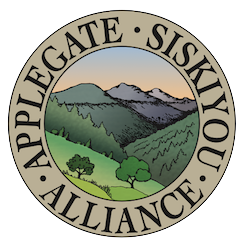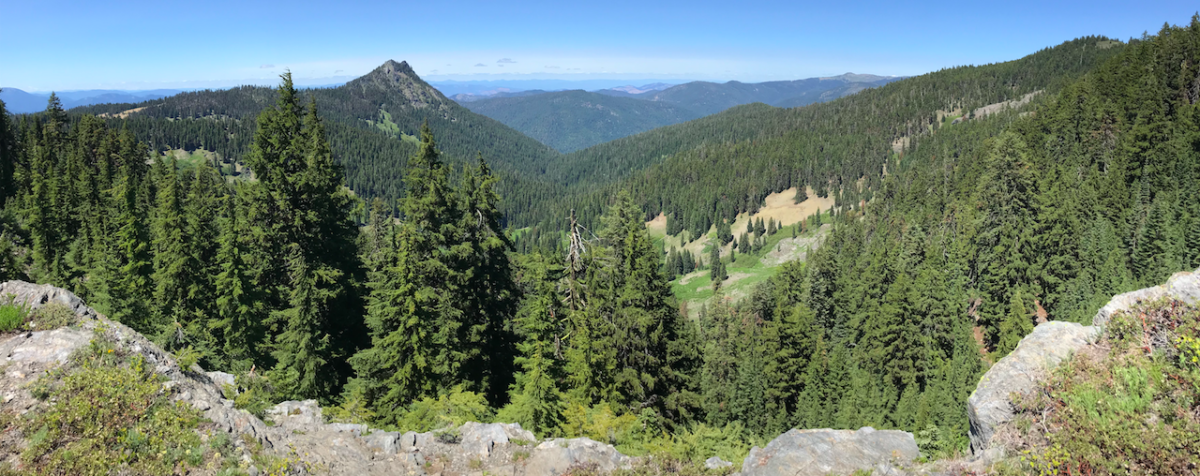
Last year ANN successfully fought to protect large portions of the Wellington Wildlands from the Middle Applegate Timber Sale. The Wellington Wildlands is a 7,526-acre roadless area west of Ruch, Oregon in the Applegate Valley. The area is known for its intact oak woodlands, beautiful grasslands, dense fields of chaparral, and dry mixed conifer forests. The Middle Applegate Timber Sale had included the entire roadless area within the “planning area.” Yet due to significant opposition by ANN and others in the region, the BLM withdrew the Middle Applegate Timber Sale and we thought that the Wellington Wildlands was saved!
Just days later, the BLM announced a new timber sale called the Bear Grub Timber Sale. The westernmost units in the Bear Grub Timber Sale are located in upper China Gulch, just outside Ruch and inside the eastern edge of the Wellington Wildlands. Much of China Gulch contains a mosaic of sunbaked south-facing slopes colonized by chaparral and oak woodland overlooking the Applegate Valley.

At its headwaters, surrounded by oak and chaparral, China Gulch contains a significant block of unlogged forest. Some of these forests support an overstory component of old Douglas fir trees. These old firs appear to have survived the large wildfires that swept through this area in the 1930s, growing in small groves, as fire mediated clumps, or as scattered individuals within the larger island of conifer forest. Soot from the 1930 fires is still evident on the bark and in deep fire scoured “cat-faces” on the uphill side of some of the largest, oldest trees. Other trees have regenerated since the fires, creating a mosaic of younger stands and maturing forest.

In China Gulch, where conifers dominate, cast heavy shade and grow in closed canopy stands, fuel conditions are often moderated supporting little shrubby growth and tall canopies. The combination of dense canopy shade and relatively arid conditions tends to discourage understory growth, and although marginal and dry, these forests have managed to grow some fairly large, old, fire resistant trees.

If logged, microclimate conditions will shift from a cool, shaded forest to a sunbaked, windswept habitat of sparse forest, logging slash, dense brush, abundant understory conifer and hardwood regeneration, and dry grass. Fuel and fire risks will only increase adjacent to the community of Ruch and for the residents living below in China Gulch. Commercial logging will also reduce wildlife habitat values by degrading some of the last unlogged, closed canopy forests in the China Gulch watershed.
The proposed China Gulch units in the Bear Grub Timber Sale are also located directly on the proposed route of the central part of the Applegate Ridge Trail (the proposed Center Applegate Ridge Trail), a non-motorized trail proposal intended to connect Grants Pass and Jacksonville, Oregon. Not only is the BLM proposing to implement 4 acre clearcuts along the first official section of trail, the East Applegate Ridge Trail, but they are also proposing to potentially log beautiful portions of the proposed Center Applegate Ridge Trail as well.

The Center Applegate Ridge Trail, is proposed to extend from Highway 238 to Humbug Creek through the Wellington Wildlands. The proposed logging activity will degrade scenic values, impacting outdoor recreation opportunities for visitors and for surrounding southwest Oregon communities. They will also be highly visible from numerous local wineries in the Ruch area, impacting the scenic values that fuel the Applegate Valley economy
The so-called “benefits” of logging the Wellington Wildlands are being inflated and misrepresented by the BLM. Timber volumes in these particular stands are extremely minimal. The stands are spread out and sparse, and unless the last remaining old forests are removed, an economically viable timber sale would be difficult to create.
The BLM is mandated under the O&C Act to maintain wildlife, watershed and recreation values, while implementing a sustainable timber harvest. Yet, it is unlikely that these values or future timber harvests can be sustained in the arid forest habitats of the Applegate Valley.

The China Gulch units are not yet marked with timber sale boundaries or for tree removal. This means the BLM could still cancel the block of timber sale units proposed up China Gulch and keep the Wellington Wildlands the intact corridor of habitat it is today. These units could be “considered but eliminated from detailed analysis”and dropped from the proposal in the Environmental Analysis. The impacts are simply too great for wildlife, for outdoor recreation, scenic values, wilderness values and nearby communities.
Our community, including many residents whose property directly surrounds the wildlands, have demonstrated support for protection of the Wellington Wildlands. We are proud of the wildlands that surround us and strongly support their protection. The protection of these wildlands will ensure the quality of habitat in our region, our quality of life in southwest Oregon, and the burgeoning outdoor recreation, tourism and amenities-based economy of the Applegate Valley. Unfortunately we still have to say it: SAVE WELLINGTON WILDLANDS!
Please consider contacting BLM officials to ask them to support our local recreation economy, reduce fire risks near our communities, maintain scenic values and protect the Wellington Wildlands, the East Applegate Ridge Trail, the Jack-Ash Trail, the Sterling Ditch Trail and Bald Mountain by canceling units in these important habitats and recreation areas. Also please ask the BLM to cancel all “group selection” logging prescriptions and focus on non-commercial fuel reduction and thinning adjacent to homes and communities. We believe that the dry forests of the Applegate Valley simply cannot maintain fire resistance or important resource values if the level of timber harvest proposed by BLM in the Bear Grub Timber Sale is implemented.
Please email:
Medford BLM District Manager, Elizabeth Burghard
eburghar@blm.gov
Ashland Resource Area Field Manager, Lauren Brown
lpbrown@blm.gov

